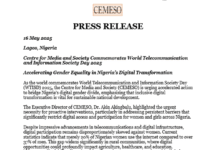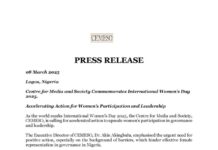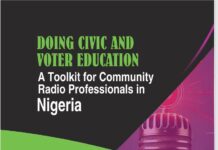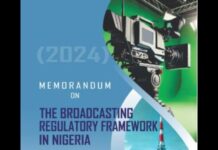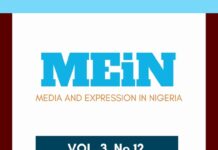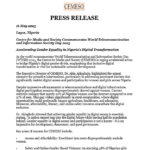The United Nations Secretary-General, Antonio Guterres, has called on everyone to defend the rights of journalists whose efforts help to build a better world for all.
In a message read by the Director, UN Information Centre (UNIC) Nigeria, Mr. Ronald Kayanja, at this year’s observance of World Press Freedom Day organised by UNIC and the Centre of Excellence, Department of Mass Communication, University of Lagos, Guterres, said he was “deeply troubled by the growing number of attacks and the culture of impunity’’ targeted at media workers around the world.”
About 100 journalists were killed in 2018, with hundreds imprisoned, bringing a total of 1,307 journalists killed between 1994 and 2018, according to UNESCO.
The Secretary-General observed a growing number of attacks and the culture of impunity, which according to UNESCO, led to the death of 100 journalists and hundreds imprisoned in 2018. “When media workers are targeted, societies as a whole pay a price.” Guterres noted, “A free press is essential for peace, justice, sustainable development and human rights. No democracy is complete without access to transparent and reliable information.”
Kayanja, however, appealed to the Nigerian press to shun reinforcing negative stereotypes about Nigeria but rather report good and positive things about the country. He said, “Nigeria is a great country. Things are not as bad as portrayed by the press.” He added.
Professor Ralph Akinfeleye, who was chair of the event called on the Nigerian Guild of Editors (NGE) and the Nigerian Union of Journalists (NUJ) to rise up to their responsibilities, regulate their ranks and clean up the journalistic space, which he observed, had been contaminated. Prof Akinfeleye called for a socially responsible free press in deepening democracy and strengthening professionalism.
Dr. Fassy Yusuf of the Department of Mass Communication, University of Lagos, in his keynote, called on media practitioners to eschew corruption, disinformation and misinformation. “The Nigerian media should eschew corruption, tinted and fake news and other unethical practices for it to live up to its billing as the fourth estate of the realm.” He said, “if the media is to play a pivotal role in deepening and sustaining democracy, it must be socially responsible while its freedom should be non-negotiable.”
Also, HoD Mass Communication, UNILAG, Prof Abigail Ogwezzy Ndisika, urged the media to be responsible and patriotic in their reporting.
Similarly, participants at the 2019 World Press Freedom Day, organised by the United Nations Educational, Scientific and Cultural Organisation (UNESCO), in collaboration with the Free Press Unlimited, the Nigeria Union of Journalists (NUJ), Centre Against Brutality and for Safety of Journalist in Africa (CABSOJA), Centre for Impact Advocacy (CiA), and Safer Media Initiative have urged journalists to uphold the ethics and professionalism of journalism practice for effective and efficient news reportage of democratic and electoral issues in Nigeria.
While delivering a message from Ms. Audrey Azoulay, Director-General of UNESCO, its Regional Director, Yao Ydo, said it was imperative to guarantee freedom of opinion through the free exchange of ideas and information based on factual truths.
He said, “While these periods are key moments of political liveliness, they also lend themselves to all the dangers of instrumentalization, combined with practices such as obstruction, harassment, unlawful arrest and even murder, which prevent journalists from doing their work freely. Impunity for crimes committed against journalists is a threat that affects all our societies. This threat requires us to be constantly vigilant. We must act together to protect the freedom of expression and safety of journalists.
In a communiqué issued at the end of the symposium, they said government and media owners should prevent and avoid censorship, given the role of the media in shaping how the public observes political information, such as election coverage and other political events.
They stated that the media must provide unbiased reportage to the citizenry before, during, and after elections. Media is critical in providing information to shape the social, legal, political, economic and cultural perception and understanding of stakeholders’ and electorates’ participation in electoral processes.
That the government, media owners, NUJ, and NPC should continually train and retrain journalists in order to ensure that ethical standards, professionalism and gender inclusiveness are adhered to.
The further stressed the need for journalists to be given free access to report court proceedings on pre- and post-electoral issues in as much as such reportage is fair, balanced and conforms to the ethics and principles of the profession, and that media owners should be held accountable by the NUJ so as to ensure the protection and welfare of journalists.
The International Press Centre (IPC) Lagos also joined in calling attention to the need for deliberate ways to combat the rising tide of fake news and disinformation as well as growing threats to journalists in reporting democratic development and elections.
Global discourse for Year 2019 WPFD, which is the 26th edition of the event held at the African Union Headquarters, Addis Ababa, centered around the theme; “Media for Democracy: Journalism and Elections in Times of Disinformation”
In a statement, Mr. Lanre Arogundade, Director, IPC, noted that the role that the media play in reporting the actions and activities of stakeholders in the electoral process remains imperative as journalists remain obligated in providing factual and truthful information to citizens.
“In the face of emerging realities, media channels especially online platforms have become susceptible channels for the dissemination of disinformation in reporting elections as witnessed in the building up to the 2019 general elections, which is a dangerous trend that ethical and professional journalistic report must address”, Arogundade said.
“Respect for truth and for the right of the public to truth is the first duty of journalists, and this must be upheld at all times, especially when it comes to reporting democratic governance”, he added.
Arogundade, however, lamented that journalists have also become targets of repression and assault of anti-democracy forces, which trample on the rights of journalists.
“The International Press Centre (IPC) through its 2019 Media and Elections situation room found it worrisome that there was an increase in the attacks on journalists during the Governorship and State Assembly elections in disregard to the rights of journalists to monitor and report election activities as guaranteed by various regulatory frameworks such as the Electoral Act, the Nigeria Broadcasting Code and the Nigerian Media Code of Election Coverage.
“These acts are inimical to an enabling operational environment for journalism”, he added, while calling on institutional stakeholders to use the 2019 WPFD as a springboard to addressing all infractions inimical to freedom of expression and free media.



